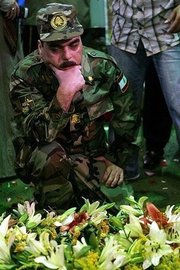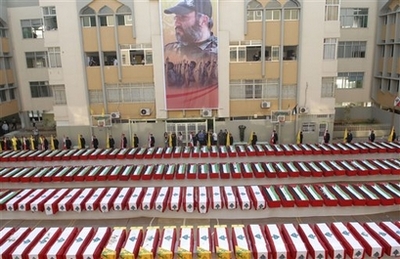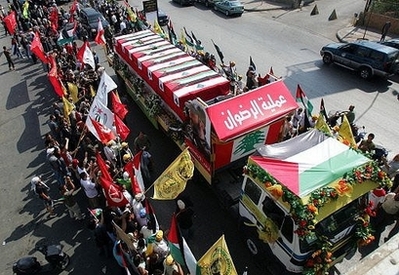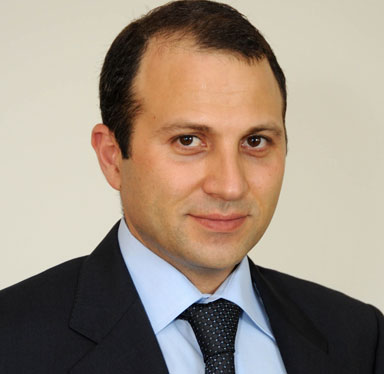 (AFP) - Israeli security officials warned on Thursday that Lebanese murderer Samir Kantar, who was freed in a prisoner swap after nearly three decades behind bars, should now fear for his own life. "Every terrorist who committed an act of terror against Israel, especially someone like Kantar, who killed a little child and two other people, is a target," one of the officials told AFP. "If there is a chance for Israel to close the file on Kantar, Israel won't hesitate," he added, speaking on condition of anonymity. Kantar, who turns 46 next week, was just 17 when he was sentenced to five life terms for a 1979 triple murder in one of the most notorious attacks in Israeli history. He was convicted of killing a police officer, a civilian and a four-year-old girl, whose skull he was accused of crushing with his rifle butt, in a raid in the northern Israeli town of Nahariya. Kantar, the longest-serving Arab prisoner in Israel, was freed on Wednesday along with four Hezbollah fighters captured in the 2006 war between Israel and the Lebanese Shiite guerrilla group. Another security official said Kantar "has become a target for killing." "Now that he is out of jail, we have no obligation towards Kantar, a loathsome murderer whose accounts will be settled in the end," the unnamed official told the top-selling Yediot Aharonot newspaper.
(AFP) - Israeli security officials warned on Thursday that Lebanese murderer Samir Kantar, who was freed in a prisoner swap after nearly three decades behind bars, should now fear for his own life. "Every terrorist who committed an act of terror against Israel, especially someone like Kantar, who killed a little child and two other people, is a target," one of the officials told AFP. "If there is a chance for Israel to close the file on Kantar, Israel won't hesitate," he added, speaking on condition of anonymity. Kantar, who turns 46 next week, was just 17 when he was sentenced to five life terms for a 1979 triple murder in one of the most notorious attacks in Israeli history. He was convicted of killing a police officer, a civilian and a four-year-old girl, whose skull he was accused of crushing with his rifle butt, in a raid in the northern Israeli town of Nahariya. Kantar, the longest-serving Arab prisoner in Israel, was freed on Wednesday along with four Hezbollah fighters captured in the 2006 war between Israel and the Lebanese Shiite guerrilla group. Another security official said Kantar "has become a target for killing." "Now that he is out of jail, we have no obligation towards Kantar, a loathsome murderer whose accounts will be settled in the end," the unnamed official told the top-selling Yediot Aharonot newspaper.
 AABEY, Lebanon (AFP) - Samir Kantar said on Thursday he had no regrets over the triple murder three decades ago that put him behind bars. I haven't for even one day regretted what I did," he told AFP as he arrived at his family home in the Druze village of Aabey, southeast of Beirut, where he was given a hero's welcome. "On the contrary I remain committed to my political convictions." Kantar, who turns 46 on July 22, was just 17 when he was sentenced to five life terms for a 1979 triple murder in one of the most notorious attacks in Israeli history. I feel enormous joy because I have returned to the ranks of the resistance and to my family," he said with defiance, dressed in a Hezbollah military uniform. People showered Kantar with rice and flower petals as he neared his humble home, where two men sacrificed a lamb in his honour. "A 16-year-old is different to a 46-year-old but his facial expressions and his smile are the same," his step-mother Siham Kantar, 71, told
AABEY, Lebanon (AFP) - Samir Kantar said on Thursday he had no regrets over the triple murder three decades ago that put him behind bars. I haven't for even one day regretted what I did," he told AFP as he arrived at his family home in the Druze village of Aabey, southeast of Beirut, where he was given a hero's welcome. "On the contrary I remain committed to my political convictions." Kantar, who turns 46 on July 22, was just 17 when he was sentenced to five life terms for a 1979 triple murder in one of the most notorious attacks in Israeli history. I feel enormous joy because I have returned to the ranks of the resistance and to my family," he said with defiance, dressed in a Hezbollah military uniform. People showered Kantar with rice and flower petals as he neared his humble home, where two men sacrificed a lamb in his honour. "A 16-year-old is different to a 46-year-old but his facial expressions and his smile are the same," his step-mother Siham Kantar, 71, told  AFP. Druze leaders Walid Jumblatt and Talal Arslan as well as Labour Minister Mohamed Fneish, a member of Hezbollah, took part in the ceremonies in Aabey, lauding Kantar as a hero of the resistance. He was released by Israel along with four Hezbollah fighters on Wednesday in exchange for the bodies of two Israeli soldiers captured in a deadly cross-border raid by the Shiite guerrilla group two years ago. Funerals were held for the two soldiers on Thursday. Their capture sparked a 34-day war between Hezbollah and Israel in which more than 1,200 Lebanese, mostly civilians, and over 160 Israelis, mostly soldiers, were killed. "We are very happy on this beautiful day, this is a victory for Lebanon and the national resistance," said Yusra Khaddaj, 39, as she stood with her three young daughters on the road leading to Aabey. "Samir Kantar is the son of all the Lebanese," she added. One banner along the road leading to Aabey read: "From Palestine, to Iraq to Lebanon, the resistance is victorious." Israel on Wednesday also handed over the remains of 199 Lebanese and Palestinian fighters killed in recent years. Hundred of supporters threw rose petals and rice and some cheered as four tractor-trailers carrying the bodies arrived in Beirut from the border town of Naqura where Wednesday's swap took place. The mothers of some of the Palestinian fighters killed in battles with Israeli troops during Lebanon's 1975-1990 civil war wept and tried to touch the coffins draped in Lebanese or Palestinian flags. Other family members carried pictures of their missing sons, as the bodies of the fallen fighters were unloaded from the vehicles into a schoolyard where a communal prayer was to be held for them. Hezbollah has dubbed the swap "the Radwan operation" after the alias used by notorious Hezbollah military commander Imad Mughnieh, who was killed in a bombing in Syria in February blamed on Israel. Kantar visited Mughnieh's tomb in Hezbollah's stronghold in the southern suburbs of Beirut before heading to his village. His release and return to a jubilant hero's welcome in Lebanon drew condemnation in Israel, where security officials warned he was now a target for killing. "Every terrorist who committed an act of terror against Israel, especially someone like Kantar, who killed a little child and two other people, is a target," one official told AFP.
AFP. Druze leaders Walid Jumblatt and Talal Arslan as well as Labour Minister Mohamed Fneish, a member of Hezbollah, took part in the ceremonies in Aabey, lauding Kantar as a hero of the resistance. He was released by Israel along with four Hezbollah fighters on Wednesday in exchange for the bodies of two Israeli soldiers captured in a deadly cross-border raid by the Shiite guerrilla group two years ago. Funerals were held for the two soldiers on Thursday. Their capture sparked a 34-day war between Hezbollah and Israel in which more than 1,200 Lebanese, mostly civilians, and over 160 Israelis, mostly soldiers, were killed. "We are very happy on this beautiful day, this is a victory for Lebanon and the national resistance," said Yusra Khaddaj, 39, as she stood with her three young daughters on the road leading to Aabey. "Samir Kantar is the son of all the Lebanese," she added. One banner along the road leading to Aabey read: "From Palestine, to Iraq to Lebanon, the resistance is victorious." Israel on Wednesday also handed over the remains of 199 Lebanese and Palestinian fighters killed in recent years. Hundred of supporters threw rose petals and rice and some cheered as four tractor-trailers carrying the bodies arrived in Beirut from the border town of Naqura where Wednesday's swap took place. The mothers of some of the Palestinian fighters killed in battles with Israeli troops during Lebanon's 1975-1990 civil war wept and tried to touch the coffins draped in Lebanese or Palestinian flags. Other family members carried pictures of their missing sons, as the bodies of the fallen fighters were unloaded from the vehicles into a schoolyard where a communal prayer was to be held for them. Hezbollah has dubbed the swap "the Radwan operation" after the alias used by notorious Hezbollah military commander Imad Mughnieh, who was killed in a bombing in Syria in February blamed on Israel. Kantar visited Mughnieh's tomb in Hezbollah's stronghold in the southern suburbs of Beirut before heading to his village. His release and return to a jubilant hero's welcome in Lebanon drew condemnation in Israel, where security officials warned he was now a target for killing. "Every terrorist who committed an act of terror against Israel, especially someone like Kantar, who killed a little child and two other people, is a target," one official told AFP.
 BEIRUT Middle east online - Lebanon's new telecommunications minister on Thursday accused Israel of bombarding Lebanese people with threatening phone calls, a day after a prisoner swap between Israel and Hezbollah. "Hundreds of people throughout Lebanon received threatening phone calls on their landlines from Israel," Gibran Bassil said. "The phone would ring, the person would answer and they would hear a message saying, 'This is from the state of Israel. Abandon Hezbollah or there will be another war, like there was in 2006,'" he said. Bassil, a member of the Free Patriotic Movement, the main Christian party in the opposition, said he has written a letter of protest to UN Secretary General Ban Ki-moon. "We consider this to be a clear violation of UN Security Council resolution 1701," Bassil said, referring to the resolution which ended the devastating 34-day war in 2006 between Israel and Hezbollah. No comment was immediately available from Israel. Many Lebanese had received similar phone messages urging them not to support Hezbollah during the course of the war which killed more than 1,200 Lebanese, mostly civilians and more than 160 Israelis, mostly soldiers. The news comes a day after the bodies of two Israeli soldiers were exchanged for five Lebanese prisoners and the remains of almost 200 Lebanese and Palestinian fighters.
BEIRUT Middle east online - Lebanon's new telecommunications minister on Thursday accused Israel of bombarding Lebanese people with threatening phone calls, a day after a prisoner swap between Israel and Hezbollah. "Hundreds of people throughout Lebanon received threatening phone calls on their landlines from Israel," Gibran Bassil said. "The phone would ring, the person would answer and they would hear a message saying, 'This is from the state of Israel. Abandon Hezbollah or there will be another war, like there was in 2006,'" he said. Bassil, a member of the Free Patriotic Movement, the main Christian party in the opposition, said he has written a letter of protest to UN Secretary General Ban Ki-moon. "We consider this to be a clear violation of UN Security Council resolution 1701," Bassil said, referring to the resolution which ended the devastating 34-day war in 2006 between Israel and Hezbollah. No comment was immediately available from Israel. Many Lebanese had received similar phone messages urging them not to support Hezbollah during the course of the war which killed more than 1,200 Lebanese, mostly civilians and more than 160 Israelis, mostly soldiers. The news comes a day after the bodies of two Israeli soldiers were exchanged for five Lebanese prisoners and the remains of almost 200 Lebanese and Palestinian fighters.
Jumblatt, Fneish stress national unity at welcome ceremony for Samir Kontar
BEIRUT Daily star: Progressive Socialist Party (PSP) leader Walid Jumblatt said on Thursday that only Lebanese national unity can protect the resistance, in reference to Hizbullah."Arms cannot protect arms ... only national unity can protect the resistance," he said, indirectly responding to Hizbullah leader Sayyed Hassan Nasrallah, who justified Hizbullah's use of arms against other Lebanese factions in early May as "using arms to defend the arms of the resistance."
Speaking at a ceremony in liberated prisoner Samir Kontar's hometown of Aabey, southeast of Beirut, Jumblatt said that there was no contradiction between the resistance and the Taif Agreement, which ended Lebanon's 15-year Civil War (1975-1990) and introduced major amendments to the Lebanese Constitution of 1926.
"There is no contradiction between the resistance and the Taif Agreement ... there is no contradiction between the resistance and the international tribunal," he said, referring to the UN-sponsored court to try suspects in the murder of former Prime Minister Rafik Hariri.
"There is no contradiction between Lebanon and the resistance after gradually agreeing on a defense strategy," he said, adding that protecting the resistance did not conflict with having sound relations and mutual respect between Lebanon and Syria.
Meanwhile, Hizbullah official and Labor Minister Mohammad Fneish, who participated in the ceremony, said that Hizbullah had never forgotten its historical relations with Jumblatt, adding that Hizbullah was ready to extend its hand to Jumblatt in the future.
Fneish said Lebanon would not have been able to free all Lebanese prisoners in Israeli jails had it not of the resistance.
"We should continue with the resistance to liberate the Shebaa Farms and the Kafar Shuba Hills," he added, referring to a border territory that Israel still occupied despite its withdrawal from most of Lebanon in May 2000.
Fneish said the agenda of the Lebanese state did not conflict with that of the resistance.
"We have wasted enough time ... we should cooperate to overcome the past, especially after the formation of the national unity Cabinet," he said.
"We will stretch our hand to our national partners with open hearts and minds regardless of unpleasant past experiences," he added.
Meanwhile, Youth and Sports Minister Talal Arslan also spoke at the ceremony and said that the new Cabinet's ministerial statement should not avoid "recognizing the legitimacy of the resistance."
Arslan paid tribute to Nasrallah and stressed "the mountains will always back the resistance."
Kontar, who was released on Wednesday after spending almost 30 years in Israeli jails, called on all Lebanese "to rally around the resistance."
"Let us all remember Kamal Jumblatt ... Had he been with us, he would have called on his comrades to cut any hand that dares to touch the arms of the resistance," Kontar said.
The late Kamal Jumblatt is the founder of the PSP and the father of Walid Jumblatt.
Kontar said the resistance shall continue even after the liberation of the Shebaa Farms.
"Whoever believes that liberating Shebaa Farms would put an end to the resistance is wrong ... even if we left the Israelis alone, they will not leave us," he said.
"Look at the way they treated the people who signed treaties with them ... Look at what they did to former Palestinian President Yasser Arafat," he added, indirectly blaming Israel for the Palestinian leader's death in November 2004.
As he arrived at his family house earlier on Thursday, Kontar said he had no regrets over what he did three decades ago.
Kontar was arrested in the northern Israeli town of Nahariya in 1978 and was convicted of killing three Israelis.
"I haven't for even one day regretted what I did," he said. "On the contrary, I remain committed to my political convictions."
Kontar received a hero's welcome at his hometown as many people from the village and neighboring areas attended the rally to meet him.
"We are very happy on this beautiful day, this is a victory for Lebanon and the national resistance," said Yusra Khaddaj, 39, as she stood with her three young daughters on the road leading to Aabey.
"Samir Kontar is the son of all the Lebanese," she added.
One banner along the road leading to Aabey read: "From Palestine to Iraq to Lebanon, the resistance is victorious."
Earlier on Thursday, Kontar visited Hizbullah's senior security official Imad Mughniyeh's tomb in Hizbullah's stronghold in the southern suburbs of Beirut before heading to his village in a triumphant convoy.
Mughniyeh was killed in a bombing in Syria last February. His death was blamed on Israel, which denied any responsibility.
Meanwhile, Israeli security officials warned on Thursday that Kontar should now fear for his own life.
"Every terrorist who committed an act of terror against Israel, especially someone like Kontar, who killed a little child and two other people, is a target," one of the officials told AFP.
"If there is a chance for Israel to close the file on Kontar, Israel won't hesitate," he said, speaking on condition of anonymity.
Israel's intelligence agencies Mossad and Shin Beth opposed Kontar's release but were over-ruled by political considerations, in order to end the mystery over the fate of two Israeli soldiers captured by Hizbullah two years ago in a cross-border raid. Israel responded to that raid by launching a devastating 34-day war on Lebanon.
The bodies of the two soldiers, Ehud Goldwasser and Eldad Regev, were returned to Israel on Wednesday as part of the swap. - with AFP
Lebanese, Palestinians celebrate as bodies of slain Arab fighters are carried to Beirut
Mohammed Zaatari and Dalila Mahdawi
Daily Star staff
SIDON: A convoy of eight trucks carrying the coffins of 200 yet to be identified Arab fighters killed in decades of fighting with Israel made their way to Beirut from Southern Lebanon Thursday. In a rare spectacle of national unity, Lebanese and Palestinians from all political and religious affiliations lined the roads to greet the procession, forcing the trucks to make repeated stops as onlookers spilled out onto the road to throw rose petals and rice.
Coffins draped in Lebanese and Hizbullah flags were transported on Mercedes trucks that better resembled celebration floats, decorated with ornate flower wreaths, pictures of slain Hizbullah commander Imad Mughniyeh and victory banners. One such banner read "The martyrs of victory from the 2006 summer war."
Spectators carried flags or photographs of martyred relatives returning as part of the German-mediated deal between Israel and Hizbullah.
"It's like he's coming back to me alive," said Hajj Hassan Wazwazz, whose son Ali had been killed in 2006 after 13 days of fighting.
Mosque and church bells blared, chiming in chaotically with the chorus of patriotic and Hizbullah songs. Representatives from Hizbullah were out en masse. One official told a female reporter: "We are laughing so you cannot say Hizbullah are 'constipated' and serious. We have feelings; I read and write poetry."
Ahmad Khalaf, a Palestinian who was expecting a relative's body to be returned, told The Daily Star: "I wish the Palestinian revolution would regain its lost fire," clearly impressed with Hizbullah's success.
Five Lebanese prisoners released by Israel Wednesday prayed at the Mughniyeh's gravesite in southern Beirut on Thursday, vowing to continue the fight against Israel.
Later, Lebanon's longest-held prisoner in Israel Samir Kontar arrived in his hometown of Aabey, south of Beirut. "This time yesterday I was in the hands of the enemy. But at this moment, I am yearning more than before to confront them," he said.
In a speech in the Southern town of Yater, the hometown of freed prisoner Hassan Kourani, Hizbullah MP Hassan Fadlallah called the swap a "historic victory" for the resistance. "Israel knows that the opposition is stronger than it once was."
Kourani meanwhile expressed his gratitude toward the Shiite group and pledged his loyalty to continue the struggle of the Islamic resistance.
While the Lebanese celebrated the day with a national holiday, the mood in Israel was somber. Former aide to Israeli Premier Ehud Olmert Miri Eisin told Al-Jazeera news channel Israel considered the swap deal, and in particular the release of Kontar, "incredibly difficult."
"Today in Israel we are mainly reflecting on the price we pay in our country to defend our borders," she added.
In more news:
BAGHDAD (Reuters) - Senior Lebanese politician Saad al-Hariri met Iraqi Prime Minister Nuri al-Maliki in Baghdad on Thursday in a further sign the Iraqi government's ties with the Arab world are expanding.
Hariri praised recent security gains in Iraq, the government said in a statement. Violence has dropped to a four-year low.
 |
Lebanese Parliament majority leader Saad al-Hariri attends a meeting between rival Lebanese leaders in Doha in this May 16, 2008 file photo. Hariri met Iraqi Prime Minister Nuri al-Maliki in Baghdad on Thursday in a further sign the Iraqi government's ties with the Arab world are expanding. (REUTERS/Fadi al-Assaad/Files) |
Few senior Lebanese officials have visited Iraq since the U.S.-led invasion in 2003, but regional countries are starting to re-engage with the Shi'ite-led government.
Hariri, son of Lebanon's slain ex-prime minister Rafik al-Hariri, is the Sunni Muslim leader of Lebanon's majority parliamentary coalition.
He also heads a multi-billion dollar business empire, and his visit coincides with an Iraqi push for more foreign investment to help rebuild the country and provide jobs.